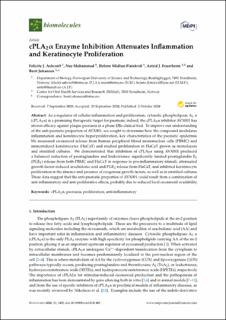| dc.contributor.author | Ashcroft, Felicity | |
| dc.contributor.author | Mahammad, Nur | |
| dc.contributor.author | Flatekvål, Helene Midtun | |
| dc.contributor.author | Feuerherm, Astrid Jullumstrø | |
| dc.contributor.author | Johansen, Berit | |
| dc.date.accessioned | 2021-02-03T09:45:19Z | |
| dc.date.available | 2021-02-03T09:45:19Z | |
| dc.date.created | 2021-01-28T23:25:43Z | |
| dc.date.issued | 2020 | |
| dc.identifier.citation | Biomolecules. 2020, 10 (1402), | en_US |
| dc.identifier.issn | 2218-273X | |
| dc.identifier.uri | https://hdl.handle.net/11250/2725947 | |
| dc.description.abstract | As a regulator of cellular inflammation and proliferation, cytosolic phospholipase A2 α (cPLA2α) is a promising therapeutic target for psoriasis; indeed, the cPLA2α inhibitor AVX001 has shown efficacy against plaque psoriasis in a phase I/IIa clinical trial. To improve our understanding of the anti-psoriatic properties of AVX001, we sought to determine how the compound modulates inflammation and keratinocyte hyperproliferation, key characteristics of the psoriatic epidermis. We measured eicosanoid release from human peripheral blood mononuclear cells (PBMC) and immortalized keratinocytes (HaCaT) and studied proliferation in HaCaT grown as monolayers and stratified cultures. We demonstrated that inhibition of cPLA2α using AVX001 produced a balanced reduction of prostaglandins and leukotrienes; significantly limited prostaglandin E2 (PGE2) release from both PBMC and HaCaT in response to pro-inflammatory stimuli; attenuated growth factor-induced arachidonic acid and PGE2 release from HaCaT; and inhibited keratinocyte proliferation in the absence and presence of exogenous growth factors, as well as in stratified cultures. These data suggest that the anti-psoriatic properties of AVX001 could result from a combination of anti-inflammatory and anti-proliferative effects, probably due to reduced local eicosanoid availability. | en_US |
| dc.language.iso | eng | en_US |
| dc.publisher | MDPI | en_US |
| dc.rights | Navngivelse 4.0 Internasjonal | * |
| dc.rights.uri | http://creativecommons.org/licenses/by/4.0/deed.no | * |
| dc.title | cPLA2α Enzyme Inhibition Attenuates Inflammation and Keratinocyte Proliferation | en_US |
| dc.type | Journal article | en_US |
| dc.description.version | publishedVersion | en_US |
| dc.source.pagenumber | 18 | en_US |
| dc.source.volume | 10 | en_US |
| dc.source.journal | Biomolecules | en_US |
| dc.source.issue | 1402 | en_US |
| dc.identifier.doi | 10.3390/biom10101402 | |
| dc.identifier.cristin | 1881810 | |
| dc.description.localcode | This is an open access article distributed under the Creative Commons Attribution License which permits unrestricted use, distribution, and reproduction in any medium, provided the original work is properly cited. | en_US |
| cristin.ispublished | true | |
| cristin.fulltext | original | |
| cristin.qualitycode | 1 | |

